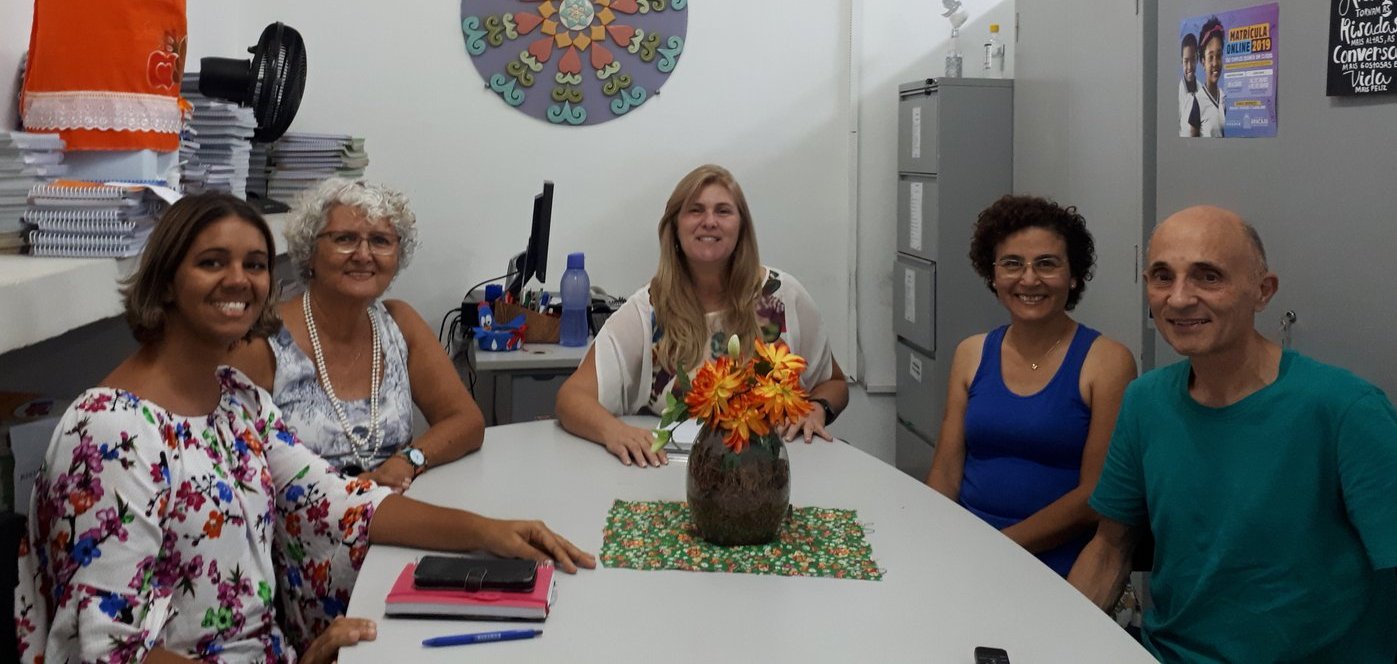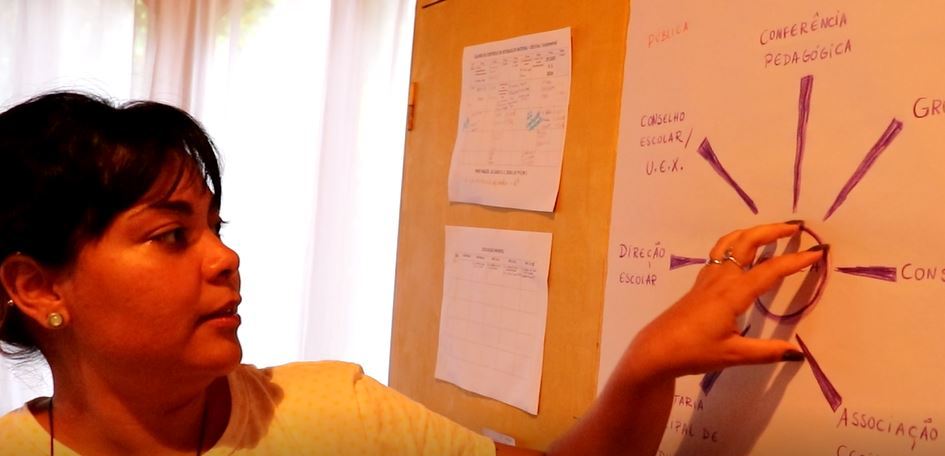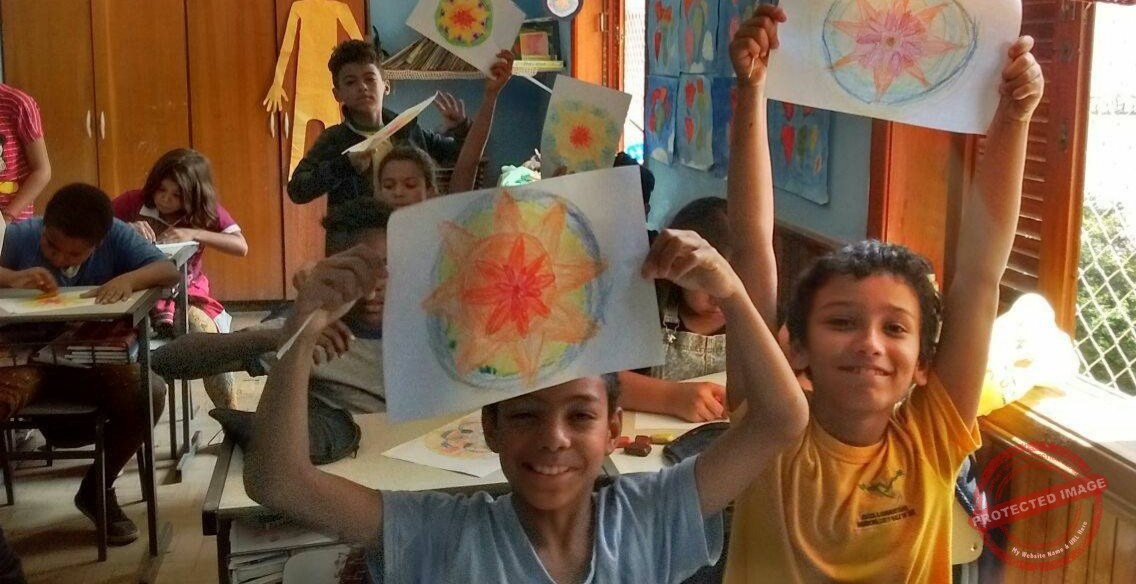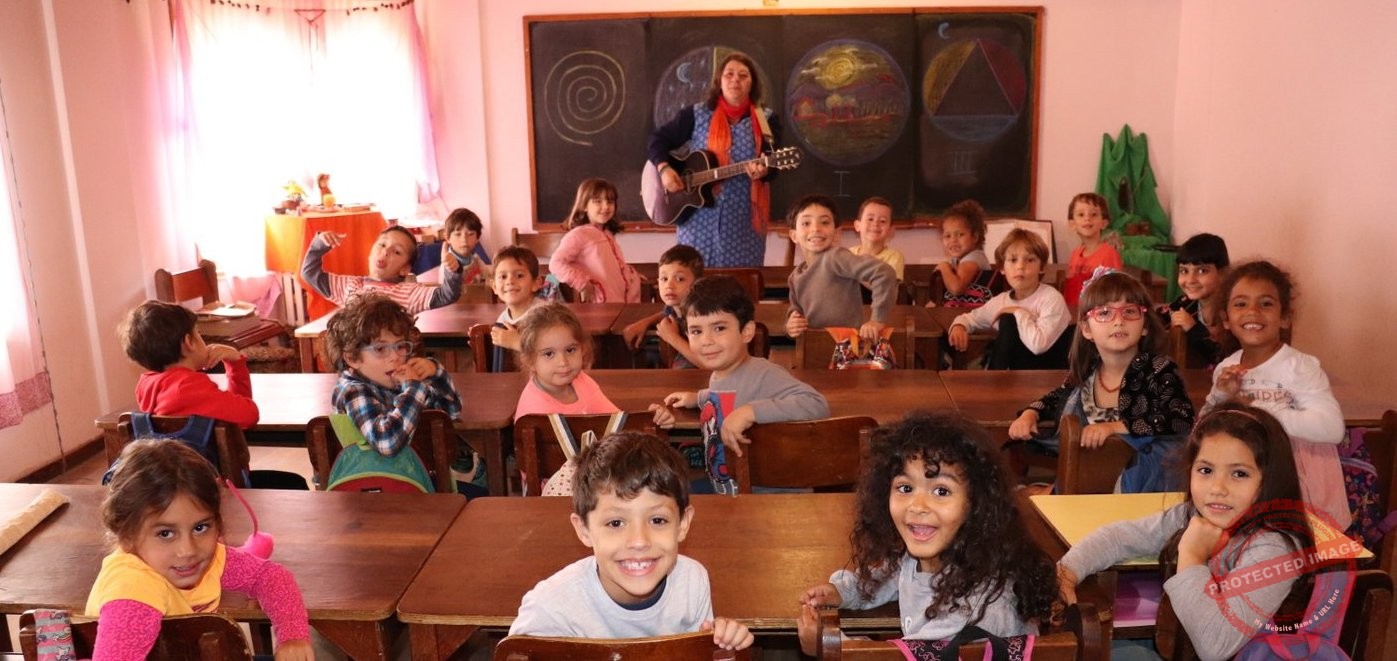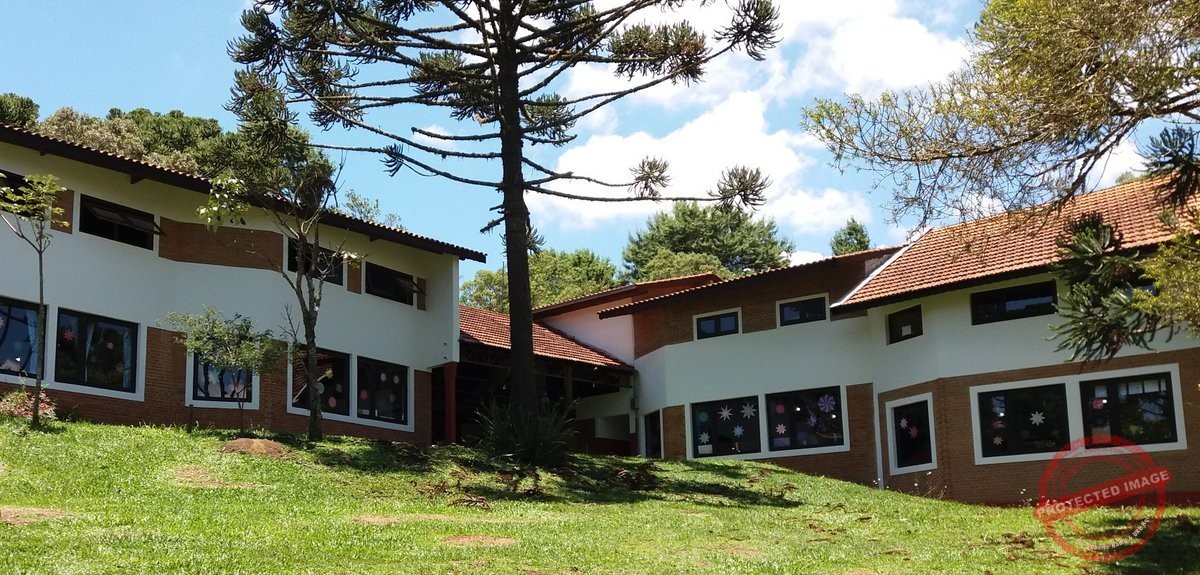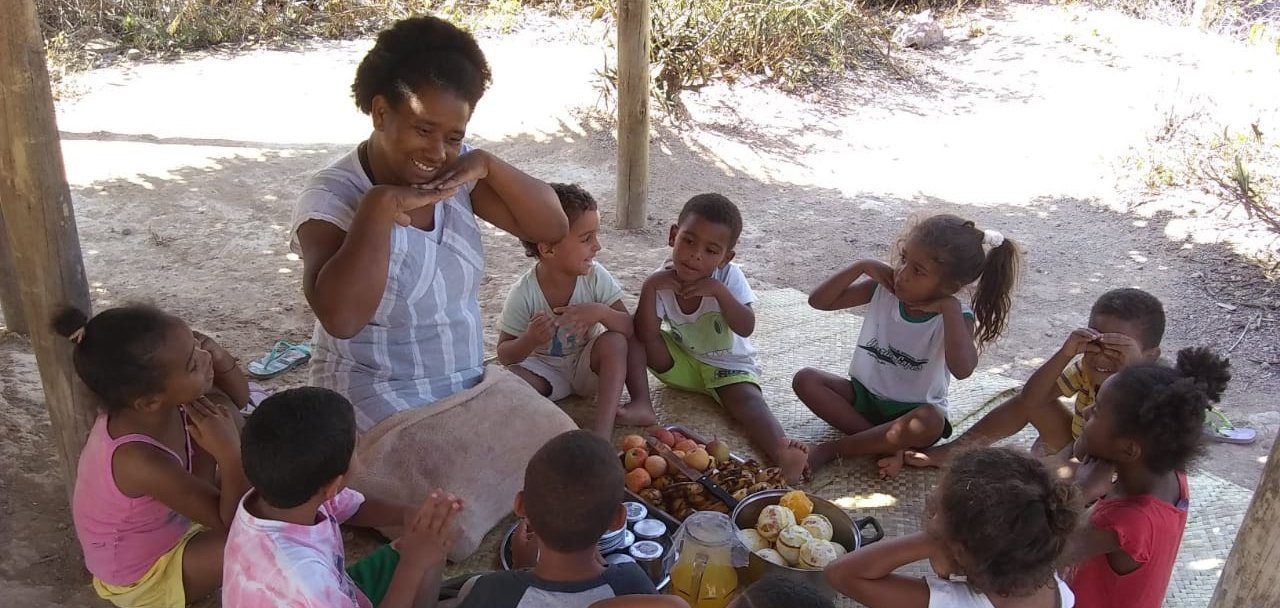[print-me target="body"]
The Waldorf Pedagogy
in public school
history – challenges – perspectives
by Rubens Salles and Rosineia Fonseca
In the first place!
We would like to start this report by thanking everyone who believed in and supported our initiative to carry out this research on public schools that adopt Waldorf Pedagogy in Brazil. We had 211 supporters who contributed to the crowdfunding we promoted, whose resources allowed us to purchase some necessary equipment and pay for the trips we took. We also count on the support of those responsible for each of the initiatives we visited, which were essential for us to be able to carry out this work, our colleagues at the institute, Milton Tortella and Edson Aragaki, with whom we shared the doubts and anxieties in the planning of the project, as well as as the fundamental support of Pedro Paulo Salles and Ruth Salles. We also especially thank the friends who hosted us on the project trips: Paulo do Eirado and Maria Aparecida in Aracaju, Ricardo Lucena in Conde, Ana Paula and Bruno Vieira in Brasília, Ione Gomes in Botucatu. It took 6 months of work, more than 90 people were interviewed and 14 schools were studied.
beginnings
In 2002 we created the Instituto Artesocial, today Instituto Ruth Salles, with the objective of contributing to make Waldorf Pedagogy accessible to children in the public school system, especially in kindergarten and elementary school.
From 2003 to 2008, we carried out the Dom da Palavra project, a continuing education course that taught some elements of Waldorf Pedagogy to teachers from the public school system, from kindergarten and elementary school. da Serra, Embu Guaçu, Espírito Santo do Turvo and Timburi. This project brought very interesting experiences and was systematized in detail in a master's research defended in 2010, available in this link.
The Dom da Palavra project showed us two important realities: 1- Elements of Waldorf Pedagogy can enrich and humanize education in public schools, provided that teachers are interested in knowing it and have the opportunity to experience its benefits with their students. 2 – It is difficult for teachers to carry out a job that is very different from the others in a public school, without having encouragement, continuing education and support from other colleagues and the school board. Without it, your initiative is doomed to lose steam.
Purpose
We are not content with the fact that Waldorf Pedagogy, which we admire so much, is accessible only to those who can afford private schools. Rudolf Steiner himself created this pedagogy so that it could be a pedagogy for the people, and it is the mission of the Ruth Salles Institute to contribute to this ideal being realized.
So, based on our experience with the Gift of the Word project, we decided to act towards achieving our objective. The fact that there are already some Waldorf schools in the public network in Brazil proves that this is possible and thus can be replicated in other initiatives. So we needed to learn from those who are already dedicating themselves to this cause. In 2018, we tried to sponsor this research, but we were not successful, and so we chose to seek crowdfunding in 2019. We succeeded. 211 supporters, and it was gratifying to see how so many people were ready to collaborate with this work.
the legal basis
We seek to know the legislation on the subject, which is detailed in chapter I of this work, and we verified that the schools that apply Waldorf Pedagogy in the public network, the affiliated ones and the public ones of origin, are supported by our Federal Constitution of 1988, in particular by items ll and lll of Article 206 and by Article 213, items le and ll.
Art. 206. Teaching will be based on the following principles:
ll - freedom to learn, teach, research and disseminate thought, art and knowledge;
III - pluralism of ideas and pedagogical concepts, and coexistence of public and private educational institutions;
Art. 213. Public resources will be allocated to public schools, and may be directed to community schools, confessional or philanthropic, defined by law, that:
I – prove non-profit purpose and apply their financial surpluses in education;
II – ensure the destination of their assets to another community, philanthropic or denominational school, or to the Public Power, in the event of closure of their activities.
The BNCC – National Common Curricular Base, updated in 2018, is also very important. What she advocates as objectives and principles for basic education in Brazil, although it is just a dream for most schools to achieve, is already a reality in Waldorf schools. That is, the arguments for carrying out Waldorf Pedagogy in public schools are in the BNCC itself.
Schools also have the right to establish their own Pedagogical Project. It represents the school's identity as a social organism. It is part of a democratic school management, and must be prepared by and for everyone: managers, teachers, employees, students and family members.
Thus, there is no legal obstacle to carrying out Waldorf Pedagogy in a public, contracted or public school of origin. It is enough for the social entrepreneurship of those who know and believe in this pedagogy, the interest of teachers and the political will of public managers.
We are many
During this research, what impressed us the most were the very special people we met. All the initiatives to take Waldorf Pedagogy to public schools were the result of the work of people deeply dedicated to the cause of education, and who have already experienced the transformations that this pedagogy is capable of bringing about in the lives of children and their families. Creating a public Waldorf school is always a long road, which requires a lot of will and dedication, the kind of strength that people truly committed to the common good have.
In addition to the initiatives we have studied here, others are already in motion, articulating to follow the same path. Several people who learned about this work contacted us to tell us about their experiences and/or ask for guidance. Our next step will be to look for ways to articulate this network for mutual support.
amazing people
We met amazing people teaching at the schools we visited, all passionate about Waldorf Pedagogy and dedicated to their students. Several knew about pedagogy because they found these initiatives in the public network, and most had never heard of it before. Many have already completed their full training, others are doing it, and some have just started in schools and are learning a little with their colleagues. When a teacher starts working according to the principles and practices of pedagogy and starts to see results, a virtuous circle begins. She (e) begins to want to know more and delve into the subject, like several we interviewed, begins to see her students more as individuals, and it seems that a magic is happening that transforms her relationship with students into one of trust and affection. . Parents begin to notice a difference in the children, they talk to the educators, they start to participate more in their children's education and get closer to the school. Countless children and families are benefiting from these initiatives.
However, while a Waldorf teacher who works in a private school usually works with all the ideal materials for their pedagogical practice, those who work in the public network have a totally different reality. The materials they receive are the same as any other public school receives, as a school cannot receive better materials than another in the same network. Adequate materials are often lacking to meet the demands of a Waldorf school, such as watercolor paint, painting paper, brushes, flutes, beeswax chalk, sheep's wool, needles, wooden toys, etc. . We even know a teacher who, in the absence of a stove to use at school, bakes rolls with the students, takes them to bake at home and brings them the next day. The schools that are affiliated can still try to get resources for this through campaigns of their sponsoring association, but in the public schools of origin it is already more difficult.
Another very important difference is that while private schools have children whose parents chose the school for its pedagogy, and who are from a higher social class, in public schools the teachers work with the children who come, without any filter, and many of these face serious situations of social vulnerability. There is a high percentage of children with special educational needs or learning difficulties, and most parents/guardians have never heard of Waldorf Pedagogy. There is always extra work on the part of the school team to explain to them about issues that usually cause strangeness in pedagogy, such as the fact that boys and girls do the same manual work, such as knitting, crochet, etc. kindergarten, etc. Clarifying some families about the difference between religion and religiosity is also often a difficult task.
But it was incredible to realize that, despite all the difficulties, the quality of the work and the teachers' relationship with the children and families was very good. In all the schools we visited, the social environment was very good. Although less attentive observers may find that the Waldorf Pedagogy carried out in these schools is not “complete”, these teachers, in these realities, do an excellent job, perfectly assume the spirit of pedagogy and deserve full support for their effort and dedication.
The Challenges for the Waldorf Community
1) Make Waldorf Pedagogy better known and accepted.
The lack of knowledge about Waldorf Pedagogy among public school educators in general is notorious, as this pedagogy is not studied in higher education courses. Thus, sometimes, teachers with public examinations choose to go to a public school that adopts this pedagogy without having any idea what it is about. And with each change of municipal government, an even bigger problem is generated, as the teams of the Waldorf schools that are affiliated always have to explain the pedagogy to the new managers, show all the work they have already done and fight for the renewal of the agreement.
To help these initiatives, and future initiatives, it is essential that we create strategies and actions to publicize Waldorf Pedagogy in all Pedagogy faculties in Brazil, which are about 2,000.
So that children from simpler families, whose parents do not know what Waldorf Pedagogy is, can attend our schools without any problems, it is important to have an adequate discourse to introduce it to these parents.
2) Achieve specific public competitions for Waldorf teachers
A big problem for most Waldorf schools in the public network is that when they need a new teacher, they happen to receive a teacher who is employed by the city hall and has the right to choose the school for its professional classification, but does not know Waldorf Pedagogy. This always generates exhaustion and extra work for the team, as it is necessary to gradually introduce the basic principles and practices of pedagogy, and try to convince this teacher to do the training. Some teachers in these conditions stay for only a year and then ask to be removed, others fall in love with pedagogy, undergo training and become great educators.
We have seen some notices for temporary hiring in which training in Waldorf Pedagogy was specified, but this is a form of hiring that is not good for the teacher's career.
We need to achieve specific public contests for Waldorf teachers. It has never been done until today, but we have not found any legal obstacles to this, so much so that in the medical field there are competitions for homeopathic doctors, for example.
3) Make up for the lack of specialist teachers
Public schools hardly hire teachers of manual work, carpentry, gardening, music, foreign language and much less eurythmy. The schools' only option has been to make the best use of the talents of their teachers to meet these needs as much as possible, or to count on the support of their association, in the case of partner schools. At Escola Cecília Meireles, for example, the history teacher, who also has experience in woodworking, teaches woodworking and the science teacher, who has a master's degree in botany, teaches gardening.
4) Support the training of teachers in the public network - initial and continuing
The courses for training Waldorf teachers are not affordable for most teachers in the public network, which always requires a lot of sacrifice from them to participate, or resources from the respective associations, when they exist. It would be very important to have a specific program to subsidize the training of teachers who already work in public schools, especially where we already have schools adopting this pedagogy.
As a public Waldorf school serves children in situations of social vulnerability, whose parents generally do not know Waldorf Pedagogy, without having the ideal materials for this pedagogical practice, and having to compensate for the lack of specialists mentioned above, their teachers need training that prepare them to act in this reality.
It would also be very important to have distance training, which could be with some online modules and other on-site practices, to reduce training costs and expand its reach. Today, the Murundu School and the Anael School, for example, which are located in the interior of Bahia, have to send their teachers to train in Aracaju, 750 kilometers away. And these are schools that have few resources to train and even keep their teachers.
Lessons from pioneers to new initiatives
1) the way is long – The establishment of a public Waldorf school is a long-term work, which requires determination and dedication from a group of people really committed with the purpose of humanizing education in the public network through Waldorf Pedagogy. In all the success stories that we know of, many obstacles had to be overcome. At this point, the history of the creation of Escola Araucária/MG is emblematic.
2) The foundations are the educators – The creation of a Waldorf school in the public network must be based on the genuine interest of a group of educators. If there is also interest from a group of parents, it will be even better. A group of dedicated and appropriate pedagogy teachers can win over parents through their work with children, but a teacher cannot be forced to be a Waldorf teacher. Waldorf schools that were created on the initiative of public management, and that were not based on the genuine interest of a group of educators, as we saw in Espírito Santo do Turvo/SP and in Ubá/MG, had a short life.
3) Early childhood comes first – The safest way to start a Waldorf project in the public network is from day care and early childhood education. In these cases, parents' initial resistance to pedagogy is much lower than in elementary school. In this way, it is possible for the initiative to grow organically, year by year, while parents learn more about pedagogy, and they themselves will want their children to continue in a Waldorf school in elementary school. The case of the Quintal do Aníbal daycare, in Jundiaí, is an example of this.
4) Our party is the children's party – The relations of Waldorf initiatives with the public power must always be professional and republican, and not partisan. When the school becomes a political flag, it runs a serious risk of having its project interrupted by an eventual opposition government.
5) Prepare your arguments – The group needs to have people who know Waldorf Pedagogy in depth, and have all the arguments to help convince public managers to accept the challenge of supporting a project with a pedagogy that is still little known and is very different from the conventional one. Taking the public manager to visit Waldorf schools that are already established, as was done by the Instituto Social Micael, in Aracaju, and by the Txai Movement in Brasília, also helps to create greater interest in the project.
6) Respect and recognize the challenges of the public manager – It should always be borne in mind that a public manager in an executive position in education has a great demand for work, as he is responsible for a large-scale work. It is not easy to study and reflect on new proposals and pedagogies under these circumstances. So we should always recognize when these opportunities happen and be very grateful for that trust. On this issue, see the tips from Cida and Paulo, from Instituto Social Micael, in chapter VIII.
7) Create a training hub – Promoting lectures, courses and workshops on Waldorf Pedagogy accessible to public school teachers and parents is very important. Many elements of pedagogy can enrich the daily practice of teachers and families, helping to create a relationship of interest and respect for the project or the school.
We saw that Associação Criança do Vale de Luz (Nova Friburgo), Instituto Social Micael (Aracaju) and Movimento Txai (Brasília) strengthened themselves by teaching courses, promoting an introduction to Waldorf Pedagogy, teaching the use of some of its elements and even training teachers. Each teacher who participates in these courses and identifies with pedagogy, also helps to disseminate it and strengthens this current dedicated to humanizing education in Brazil.
8) Invest in community integration – For the local community to accept the initiative well, it is essential to make it the protagonist of the project. For this, it is very important to invest in the training of educators in the community itself. Lectures and workshops on pedagogy, and the Escola de Pais, are also very important, as are cultural and artistic activities open to the community.
It is essential for the school to have a community of engaged parents, as we saw in the Cecília Meireles School, because this way the school will have greater political strength. Engaged parents help to get the improvements that the school may need from the city hall. The strength and determination of a community created from a Waldorf school, by teachers and parents who have already experienced the value of this pedagogy, is able to find ways to keep a school alive in their community, if the project has difficulties along the way, as happened in the case of Escola Casa da Mata.
9) Focus on planning and organization – In an affiliated school, which requires raising funds to meet the demands that the city hall does not meet, management is a major challenge and a determining factor for success. From idealism alone the process cannot be sustained. In addition to planning and organizing, be very transparent. It is also important to communicate well, and to have a website with all the information available and well organized. Documents such as bylaws, minutes of meetings, balance sheets, newsletters, strategic vision, goals plan and annual activity report must be available on the website. This gives more credibility to the association, both with the public authorities and with possible sponsors. The Murundu School association is an example in this sense.
10) Prepare to meet the demands of public management – Every public school needs to meet the inherent bureaucracy of public management in each municipality or state/district, including external evaluations, such as IDEB, for example, the establishment of a School Management Action Plan, and the elaboration of the Pedagogical Project of the school. In addition to managing the association, if any, and the specific instances of a Waldorf school, it is also necessary to create the Association of Parents and Employees and the School Council. See the details on these demands in Chapter I.
11) Attention to the future of students – Our attention was drawn to the care that Escola Vale de Luz has in preparing 5th grade students so that they can make the transition to the 6th grade of a conventional school without suffering many difficulties. Attention to the future success of students is very important.
12) Do not neglect cultural adaptation – It is important for pioneering initiatives, in regions where there are no older Waldorf schools, to adapt content, such as stories, verses, songs, circles, games and crafts to the culture of the region.
13) A humanizing education changes the world – Araucária School, being the only one in the region for more than 40 years, is a great example of how a well-structured school with a humanized, emancipatory pedagogy focused on the integral development of the human being has the power to transform an entire community in cultural, social and economic aspects. In a region where almost everyone was illiterate and lived on subsistence agriculture, today young people leave who have already followed careers such as Medicine, Law, Nursing, Pedagogy, Performing Arts, Music, Architecture, Animal Science, Agronomy, Administration, Tourism and Hospitality among other professions.
14) Believe – Educators ready to learn about and adopt Waldorf Pedagogy are out there in all corners of Brazil, as are parents who will want this educational path for their children. Our great challenge is to reach them through the public school, and facing it will give more meaning to the transformative mission started 100 years ago by Rudolf Steiner.


